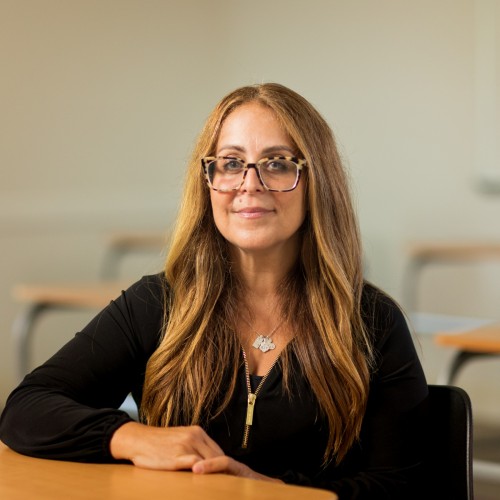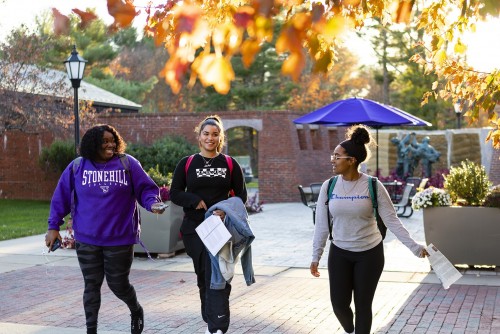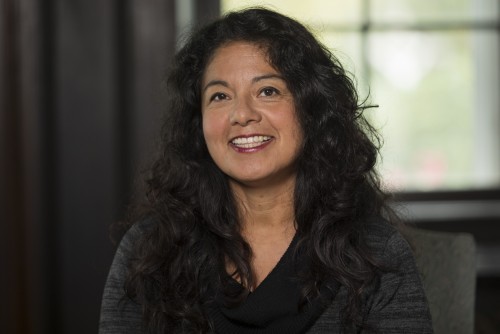Residency Offers Immersive Education for Future Teachers
The Stonehill Teacher Residency, part of our Inclusive Education Master's Degree Program, is at the vanguard of a national trend in teacher apprenticeships.
With too few teachers entering the profession with practical classroom experience, the educational system in the United States is in crisis — and the problem is only growing.
Enter the Stonehill Teacher Residency (STR) program.
A one-year, intensive graduate degree, the STR program equips future teachers with the vital skills needed to lead in 21st century classrooms, while also increasing teacher diversity. The program is at the vanguard of a growing core of teacher apprenticeship initiatives across the nation and provides a stipend that can significantly defray the cost of the degree.
STR debuted at Stonehill in 2020, led by Elizabeth Stringer Keefe, associate professor of education and co-director of graduate teacher education with Rebekah C. Louis, assistant professor of education.
“When students enter the program, they complete an intense course of study during the summer,” says Stringer Keefe. “They are then paired with a local partner district, where they serve as a Resident under a veteran teacher for the full academic year.”
A hallmark of the STR program is the exposure to the full range of professional experiences that students will encounter as full-time educators.
Our Residents’ experiences go beyond the state’s requirements for licensure, such as attending a school committee meeting, sitting in on a disciplinary meeting with a principal or administrator, attending a student’s Individualized Education Plan (IEP) meeting, and participating in a grade-level curriculum meeting
“Our Residents’ experiences go beyond the state’s requirements for licensure, such as attending a school committee meeting, sitting in on a disciplinary meeting with a principal or administrator, attending a student’s Individualized Education Plan (IEP) meeting, and participating in a grade-level curriculum meeting,” explains Louis, who also serves as Coordinator of Graduate Clinical Experience.
It’s an approach that Michaela Antonellis ’20, M’21 says prepared her well for her current role as a third- through fifth-grade special education teacher at the Cunniff Elementary School in Watertown, Massachusetts — the same school she attended as a child.
Antonellis completed her residency at The League School, in Walpole, Massachusetts, specializing in autism education.
“This was probably one of the most intense settings I’ll ever work in,” says Antonellis, who also earned her undergraduate degree at Stonehill. “I learned so much from it. For example, when I held my first IEP meeting, I already had experience with it, so it wasn’t as overwhelming. Working at The League School gave me the full experience of special ed.”
Stringer Keefe and Louis were also recently awarded $163,919 by the Massachusetts Department of Elementary and Secondary Education for their Equity, Diversity and Justice in Education Scholars and Teacher Residency Grant. This STR grant initiative supports the recruitment and retention of a diverse teacher workforce through a mentoring partnership between veteran teachers and STR graduate students admitted to the grant program.
Among its benefits, mentees can receive funding for up to two-thirds of tuition alongside mentoring from experienced educators. Mentors gain professional development opportunities as well as tuition remission toward a 15-credit Diversity, Equity and Inclusivity Graduate Certificate.
Maria Apale M’21, a middle school special education teacher in Randolph, Massachusetts, is an STR graduate who has come full circle, from mentee to mentor.
“When I graduated from Stonehill, I felt like I had the knowledge to advocate for other people like me,” says Apale, who earned a Ph.D. in child psychology in her native Philippines before moving to the United States nearly six years ago. “All I learned at Stonehill, I am applying in my workplace right now. Stonehill opened up opportunities for me to grow as an educator.”
For fellow STR graduate J.P. Powers M’22, who now teaches English and biology at South Shore High School in Hingham, Massachusetts, the connections he made with his professors and peers were an important part of his experience.
“My professors were fantastic, caring people,” says Powers, who joined STR after a 10-year career as an attorney. “They’re committed to the profession and making sure we’re better teachers at the end of [the program]. Getting to know my colleagues was really valuable to me.”
Current STR student Amanda Perra ’19 is set to earn her master’s degree this spring. She is completing her residency at Boyden Elementary School in Walpole.
“I work primarily in an inclusive fifth grade classroom where I support students on IEPs. I also teach a phonics program to second grade students,” says Perra, who also received her undergraduate degree at Stonehill. “I feel as though I’m the bridge between special and general education and can help students reach their goals in the least restrictive environment. I absolutely love my job.”
Our teachers are prepared to create inclusive spaces and learn to value family and community expertise. This approach helps neutralize power and privilege and invites true collaboration in addressing larger issues facing society.
According to Stringer Keefe, the STR program is a tangible way the college is advancing its mission of creating a more just and compassionate world.
“We produce well-prepared teachers whose training is grounded in educational equity, which is a powerful equalizer of oppression and injustice,” she notes. “Our teachers are prepared to create inclusive spaces and learn to value family and community expertise. This approach helps neutralize power and privilege and invites true collaboration in addressing larger issues facing society.”
-
Learn More About Inclusive Education
Earn a master's degree in inclusive education with a specialization in diversity, equity and inclusivity, or Massachusetts teacher licensure in math/science, 5-8, or special education, PreK-8 or 5-12.
-
Request Information About Teacher Residency
Sign up now to be added to our mailing list, and we will show you how Stonehill could become part of your story.
-
Ask a Question
Alexandra Caine coordinates graduate recruitment and enrollment for Stonehill's Office of Graduate Studies. She is an excellent resource for prospective students looking to learn more about our program offerings, application requirements and deadlines, and funding your graduate education.




